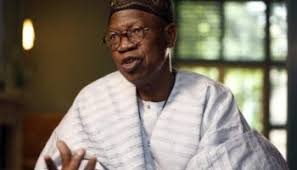Nigeria’s Minister of Information and Culture, Mr. Lai Mohammed, warned religious leaders not to stigmatise President Muhammadu Buhari.
In an apparent reaction to the Christmas message of Bishop Matthew Kukah, the Catholic Bishop of Sokoto in northern Nigeria, Mohammed, warned religious leaders in the country to “refrain from stoking the embers of hatred and disunity” which could “trigger unintended consequences”.
In the message, Bishop Kukah lamented the worsening insecurity in Nigeria and accused Buhari of nepotism.
In a statement on Saturday, the minister noted that Bishop Kukah and other religious leaders have a responsibility to speak truth to power but “such truth must not come wrapped in anger, hatred, disunity and religious disharmony”.
Mohammed said it was “graceless and impious for any religious leader to use the period of Christmas, which is a season of peace, to stoke the embers of hatred, sectarian strife and national disunity”.
Referring to the Bishop Kukah’s message which stated that there could have been a coup or war in the country should any other leader exhibit Buhari’s “nepotistic behaviour”, the minister warned: “Calling for a violent overthrow of a democratically-elected government, no matter how disguised such a call is, and casting a particular religion as violent is not what any religious leader should engage in, and certainly not in a season of peace.”
“While some religious leaders, being human, may not be able to disguise their national leadership preference, they should refrain from stigmatising the leader they have never supported anyway, using well-worn and disproved allegations of nepotism or whatever,” Mohammed said.
The Minister explained that whatever challenges Nigeria may be going through at this moment can only be tackled when all leaders and indeed all Nigerians come together, not when some people arrogantly engage in name-calling and finger-pointing.
Another Catholic Cleric, Archbishop Emeritus of Abuja, John Cardinal Onaiyekan, has said that Nigerians will be happy to have a government that can be trusted.
Speaking during an interview on Channels Television’s Sunday Politics, he lamented the lack of trust in President Muhammadu Buhari’s administration.
“We will be really happy to have a government to trust,” he said, adding that “All those who speak on behalf of the government should believe in the sacredness of the truth.
“Nigerians are ready to listen to the truth. But when they are consistently deceived, it is neither good for the government nor good for the governed.
“Here, everybody needs to do an examination of conscience. I will throw the ball back, not only to President Buhari himself but all those who are with him running the affairs of this nation,” he said.
Meanwhile, the Financial Times of London described Nigeria as a country going backwards economically and plagued with terrorism, illiteracy, poverty, banditry, and kidnapping and risks becoming a failed state if things don’t take a drastic turn.
The UK-based newspaper said this in an editorial on Tuesday titled, ‘Nigeria at Risk of Becoming a Failed State’ that the abduction and subsequent rescue of over 300 schoolboys in Kankara, Katsina State, revived memories of the 276 Chibok schoolgirls abducted in Borno State in 2014.
According to the newspaper, while the government’s claim that no ransom was paid to the abductors of the schoolboys remains doubtful, other acts of criminality could not be overlooked.
The newspaper said that Buhari, who has less than three years left in office, must use the remainder of his term, to redouble efforts at improving security.
It advised the government to restore trust in key institutions, among them the judiciary, the security services and the electoral commission, which will preside over the 2023 elections.
GIK/APA


